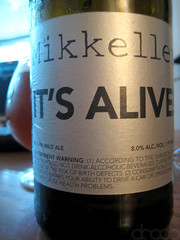What if a “book” is more than just a fixed collection of text at a given point of time? What if the “story” inside the book evolves and changes over time? What does this mean for the idea of a “book”?
Books have always changed over time, of course. There have always been “second editions”, “third editions”, etc. There have been different printings by different publishers – or differences between a hard-cover and paperback version. There have been translations… and other various different versions of books.
But those were historically very discrete “BIG DEALS”. I mean… whoa… there was enough interest to create a second edition? or a 3rd? or a 4th? Wow!
They involved great amounts of time, effort and perhaps most importantly money to go through the whole production process again to great the new “edition” of the book. It was not an easy process.
Ebooks fundamentally change all of that.
Last night I was working late into the night on an update to my “Migrating Applications to IPv6” book and thought about how bizarrely different ebooks are.
Consider this:
- I originally wrote the book in May 2011 prior to World IPv6 Day on June 8, 2011. The original book refers to that event as coming up in the future.
- Last night I updated the book to discuss some of the lessons learned from World IPv6 Day in 2011 and to also talk about the upcoming World IPv6 Launch on June 6, 2012. I expect this update to go out in a week or two.
- In July (or anytime after June 6), I can then update the book to talk about World IPv6 Launch in the past tense and talk about anything learned out of that experience.
The “book” is no longer fixed to a specific point in time.
Again, sure, this has always been true with creating new “editions” of a book, but this is where ebooks make this so… trivial.
As an author, here is the full extent of my update process:
- I update the text of the book on my local computer. Have someone proofread it, check it, etc.
- I commit the changes to O’Reilly’s Subversion repository for my book. (Yes, O’Reilly is a geeky kind of publisher that lets authors work via SVN repos.)
- I send an email to my production editor with bullet points of changes.
- Assuming he’s fine with the changes, he triggers a process that creates the appropriate ebook files and puts them up on O’Reilly’s distribution site, Amazon, etc.
- Readers who purchased the book directly from O’Reilly get an email saying that they can download the updated version. I can blog about it, promote it. Anyone who buys the new version will at this point have the updated text.
Boom. That’s it!
Simple. Easy. Done.
Now, granted, O’Reilly has done a bunch of “magic” to make that step #4 “just work” from the author’s point of view… but it doesn’t matter to me. The point is that I can write my updates, commit the changes, ping my editor and… ta da… a new version is out there!
It’s that last step that is really the differentiator for ebooks. Notifying the reader that a new version is available.
Because, of course, the precise version of a book or an ebook is fixed to a specific point in time. When you download it to your computer or ereader, you have the version of the ebook as it exists now at this moment in time.
Without a notification/update system, you may never know that there are changes and updates that you can download.
But with such a system, the “book” becomes so much more… it is now a living, breathing document that will change and evolve over time. Perhaps slowly… or not at all if an author doesn’t create updates… but then perhaps VERY rapidly under changing circumstances.
The book that you read today may be completely different than that exact same book that you look at again in a month.
It changes the notion of the “permanence” of books… you have the capacity to enter into more of a “relationship” with the book and the author. You have the chance to see it grow and evolve. Or not.
As an author I actually find it incredibly exciting. A chance to keep a book always up-to-date. A chance to evolve the book based on reader feedback. A chance to change the “book”. Sure, there is a bit of a responsibility to your readers as you enter into a relationship like this where updates may come to be expected – and some authors will not want to enter into that relationship. They may want to simply throw the book out there and be done with it.
But for those of us who do want to treat the book as a living, breathing document, that is the exquisite beauty of an “ebook” (with an update/notification system).
The “book” is alive.
Image credit: drooo on Flickr
If you found this post interesting or useful, please consider either:
- following me on Twitter;
- adding me to a circle on Google+;
- subscribing to my email newsletter; or
- subscribing to the RSS feed.

What’s your primary e-book authoring tool?